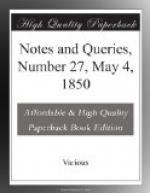EMDEE.
April 25. 1850.
Roasted Mouse.—I have often heard my father say, that when he had the measles, his nurse gave him a roasted mouse to cure him.
SCOTUS.
* * * * *
THE ANGLO-SAXON WORD “UNLAED.”
A long etymological disquisition may seem a trifling matter; but what a clear insight into historic truth, into the manners, the customs, and the possessions of people of former ages, is sometimes obtained by the accurate definition of even a single word. A pertinent instance will be found in the true etymon of Brytenwealda, given by Mr. Kemble in his chapter “On the Growth of the kingly Power.” (Saxons in Engl. B. II. c. 1.) Upon this consideration I must rest for this somewhat lengthy investigation.
The word UNLAED, as far as we at present know, occurs only five times in Anglo-Saxon; three of which are in the legend of Andreas in the Vercelli MS., which legend was first printed, under the auspices of the Record Commission, by Mr. Thorpe; but the Report to which the poetry of the Vercelli MS. was attached has, for reasons with which I am unacquainted, never been made public. In 1840, James Grimm, “feeling (as Mr. Kemble says) that this was a wrong done to the world of letters at large,” published it at Cassell, together with the Legend of Elene, or the Finding of the Cross, with an Introduction and very copious notes. In 1844, it was printed for the Aelfric Society by Mr. Kemble, accompanied by a translation, in which the passages are thus given.—
“Such was the people’s
peaceless token,
the suffering of the wretched.”
l. 57-9.
“When they of savage spirits
believed in the might,”
l. 283-4.
“Ye are rude,
of poor thoughts.”
The fifth instance of the occurrence of the word is in a passage cited by Wanley, Catal. p. 134., {431} from a homily occurring in a MS. in Corpus Christi College, s. 14.:—
“Men etha leoces can hep re3þ se hal3a se[s] Io[hs] þaep re Hael. eode ofen þone bupnan the Ledpoc hatte, on in[=e]n aenne p[.y]ptun. Tha piste se unlaesde iudas se þe hune to deaþe beleaped haefde.”
In Grimm’s Elucidations to Andreas he thus notices it:—
“Unlaed, miser, improbus, infelix. (A. 142. 744. Judith, 134, 43.). A rare adjective never occurring in Beowulf, Coedmon, or the Cod. Exon., and belonging to those which only appear in conjunction with un. Thus, also, the Goth. unleds, pauper, miser; and the O.H.G. unlat (Graff, 2. 166.); we nowhere find a leds, laed, lat, as an antithesis. It must have signified dives, felix; and its root is wholly obscure.”
In all the Anglo-Saxon examples of unlaed, the sense appears to be wretched, miserable; in the Gothic it is uniformly poor[1]: but poverty and wretchedness are nearly allied. Led, or laed, would evidently therefore signify rich, and by inference happy. Now we have abundant examples of the use of the word ledes in old English; not only for people, but for riches, goods, movable property. Lond and lede, or ledes, or lith, frequently occur unequivocally in this latter sense, thus:—




